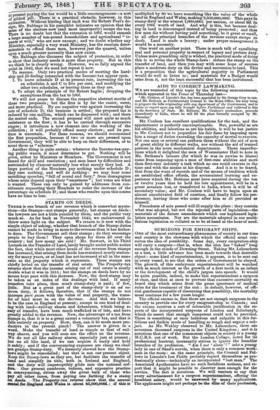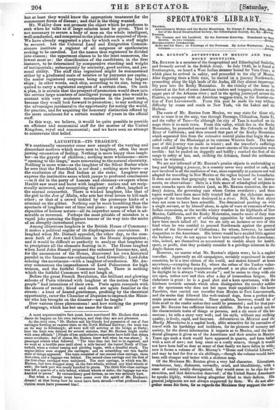SURGEONS FOR EMIGRANT SHIPS.
ONE of the most extraordinary phtenomena of society in our time and country is the slowness with which the official mind con- ceives the idea of possibility. Some day, every emigration-ship will carry a surgeon—that is, when the idea has " baked" long enough in the minds of Downing Street. Taking Mr. Labouchere as a test, a little advance has been made towards that desirable object : some kind of superintendent, it appears, is to be sent out in every vessel, to see that the orders of Government be obeyed. The growth of this embryonic superintendent will be watched with as much interest as the growth of a first tooth in an infant or the development of the child's jargon into speech. It would be quite possible, indeed, to make this superintendent a surgeon at once, and thus at once to prevent that excessive mortality on board ship which arises from the gross ignorance of medical rules for the treatment of the sick : in default, however, of offi- cial gentlemen capable of discerning that possibility, the mortality must continue for a few years longer.
The official excuse is, that there are not enough surgeons in the country to provide one for every emigrant-ship to Canada ; and the excuse receives a sort of colourable justification in the re- ports of the incorporated surgeons of London and Edinburgh, which do assert that enough competent could not be provided. There is something at once ludicrous and culpable in this fas- tidious and finikin mode of handling so rough and urgeat a sub- ject. As Mr. Wakley observed to Mr. Labouchere, there are seventeen thousand surgeons in the United Kingdom ; and it is notorious that one of the commonest objects in society is a young M.C.R.S. out of work. But the London College, noted for its professional hauteur, incessantly strives to ignore the humbler branches of its profession. " Am I not alone' ? " asks a young lady in one of Sand's novels, when there is only a common work- man in the room : on the same principle, the Council and Fel- lows in Lincoln's Inn Fields probably regard themselves as pro- fessionally alone—technically an incorporated "last man." The Associated Apothecaries have no such fastidious notions, and re- port that it might be possible to discover men enough for the service. The fact is notorious. We will venture to say that every advertisement for a surgeon superintendent, offering the humblest salary, would be answered by many applications. The applicants might not perhaps be the elite of their profession,
but at least they would know the appropriate treatment for the commonest forms of disease; and that is the thing wanted. Mr. Wakley does not promote the object which he professes to seek when he talks as if large salaries must be given. That is not necessary to secure a body of men on the whole intelligent, well-conducted, and competent to the plain duties required of them. We have already suggested a plan by which such a staff might be secured. Let the Colonial Land and Emigration Commis- sioners institute a register of all surgeons or apothecaries seeking to be enrolled. Let the names thus registered be divided into classes; the uppermost classes to be the least numerous, the lowest most so: the classification of the candidates, in the first instance, to be determined by comparative standing and weight of testimonials; subsequently by seniority, good service, and per- sonal ability. The staff thus organized might be remunerated either by a graduated scale of salaries or by payment per capita; the senior registered surgeons being appointed to the largest ships ; in other words, each ship, according to its size, being re- quired to carry a registered surgeon of a certain class. On such a plan, it is certain that the prospect of promotion would draw into the service large numbers of intelligent young men who would be content with very moderate recompense in the junior ranks, because they would look forward to promotion ; to say nothing of the advantages incidental to the opportunity for seeing the world, for practice, and for acquiring the honorary distinction offered by the mere enrolment for a certain number of years in the official staff.
In this way, we believe, it would be quite possible to provide an efficient and economical staff for the marine of the United Kingdom, royal and commercial; and we have seen no attempt to contravene that belief.



























 Previous page
Previous page